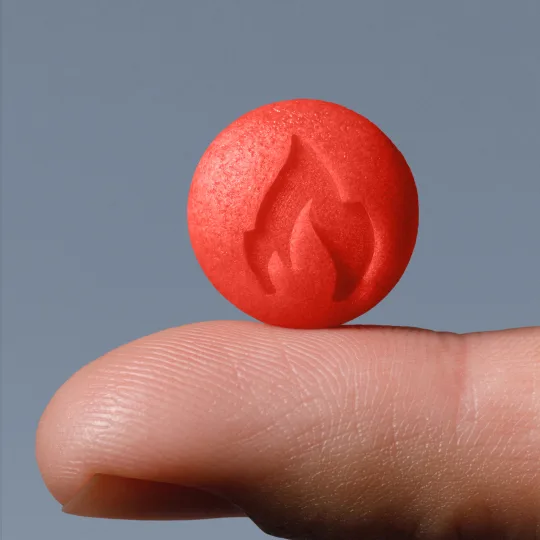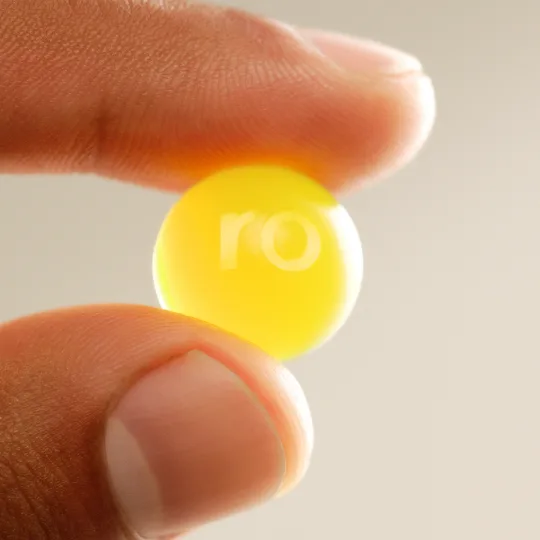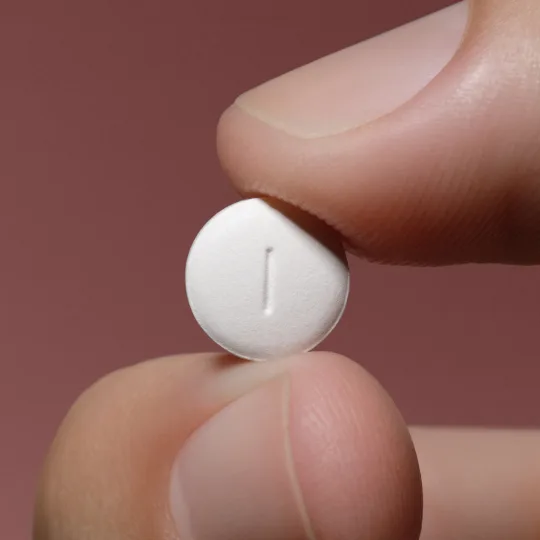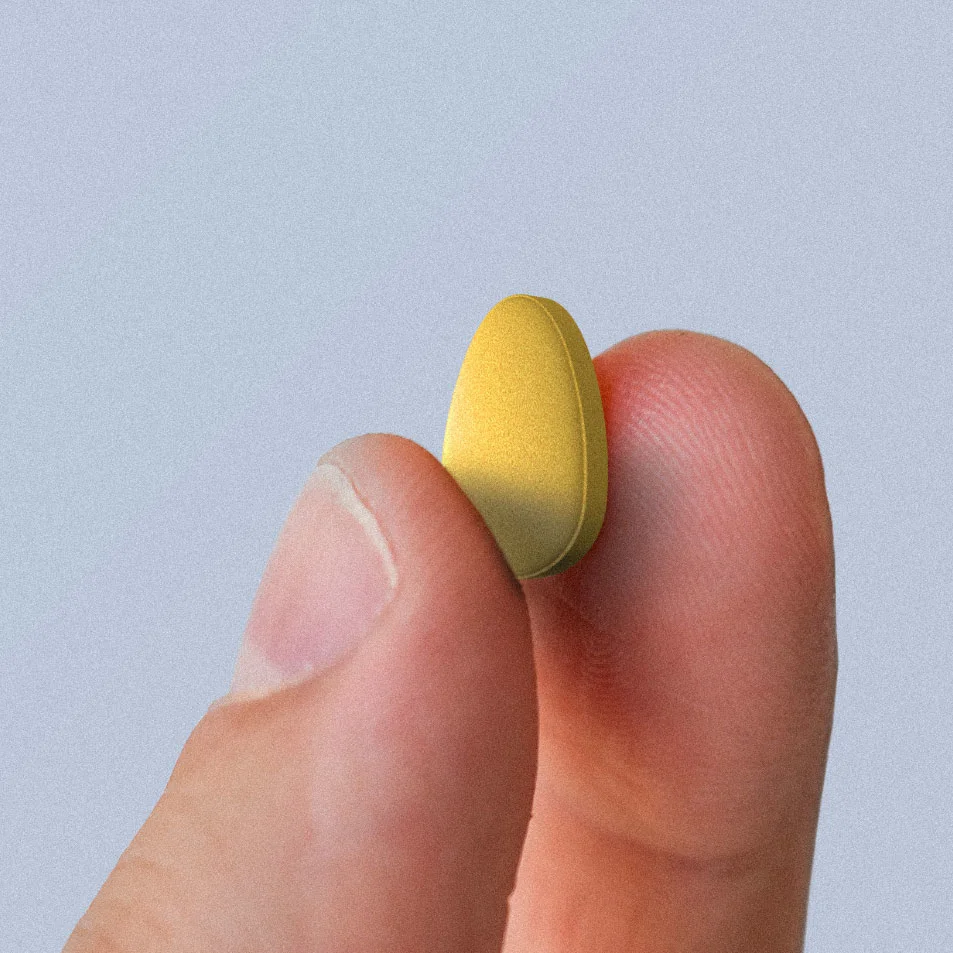Here's what we'll cover
Here's what we'll cover
Here's what we'll cover
Many of us have had these thoughts at one time or another, especially with a new partner: How long should sex last? Am I doing this right? For those with penises, Am I big enough? Am I lasting long enough? The answers are less complicated than you might think: “As long as you and your partner want it to,” "Ask your partner," "yes," and "very likely."
Many of us have bought into sexual mythology—particularly when it comes to penetrative sex and the expectation to "last for hours" and "go all night." But the average sex time is probably shorter than you think, and you may be feeling unnecessary added anxiety.
But if things are progressing a little too quickly in the bedroom—meaning, too fast for you and your partner to have a pleasurable experience—you may be dealing with more than a simple case of performance anxiety. Continue reading to learn more about how long sex should last and when it’s time to make an intervention.
How long should sex last?
The short answer is the average duration of sex shouldn’t (and doesn’t!) really matter. If you and your partner(s) are generally left satisfied, the length of time spent having sex is of no consequence.
But if your curiosity is just too strong to ignore, there is some data on how long intercourse lasts on average, and it’s between three and 13 minutes—with some caveats. Let’s break it down.
In one study researchers asked a group of sex therapists: how long does sex normally last? Their answers? One to two minutes was determined to be "too short," while 10–30 minutes was "too long." On the other hand, three to seven minutes was rated "adequate," and seven to thirteen minutes “desirable..
One important thing to note, though: This survey was only focused on heterosexual, penetrative, vaginal sex. It’s entirely possible the answers would be different for other types of sexual encounters.
And on that note, every couple and every partner is different. Your partner may take longer to reach orgasm than you—and that can be okay, as long as you are mindful to use techniques to ensure both you and your partner achieve satisfaction, no matter how long the session lasts.
What does research say about the average duration of sex?
We’ve established there’s no perfect amount of time sex should last, but you may be wondering how long sex normally lasts on average. Lucky for your curiosity, some researchers have wondered the same thing and taken this question to the lab.
One study asked 500 couples to press a stopwatch at penetration and then at ejaculation for one month. Reported durations ranged from 33 seconds to 44 minutes, but the average for penetrative vaginal sex was 3–7 minutes.
Another similar study looked at average times for sexual intercourse in people from five different countries. The average found in this study ranged from 4–10 minutes, with different results for different countries.
While the numbers are slightly different in these two studies, the average range is quite similar. So, if you typically have penetrative sex somewhere in the range of 3–10 minutes, you’re well within normal ranges. A good rule of thumb, though, is not to let anyone else's sex life—or what they claim about their sex life—make you feel bad about your own. You do you (and/or your partner). The most important thing is that you and your partner are generally satisfied with how things are going in the bedroom.
5 factors that may affect how long sex lasts
There’s no perfect amount of time that sex “should” last, and everyone is different, but there are certain things that may impact how long you last in bed.
1. The type of sex
Before we get into other factors that can impact how long sex lasts, we first need to take a step back and get on the same page about how exactly we’re defining sex. For much of modern history, sex has been defined by penile-vaginal penetrative intercourse. Penile-vaginal intercourse is often measured by intravaginal ejaculatory latency time (IELT)—and as we’ve seen from the studies we’ve looked at, that’s how most scientists have examined questions around how long sex lasts.
We know, though, that there are unlimited ways to have sex, and many don’t involve a penis and a vulva. By categorizing acts of oral sex, digital sex, and any sex that doesn’t involve penetration by a penis as “foreplay,” we dismiss the sex had by couples and partners who don’t possess exactly one penis and one vagina.
Research is already limited on the “ideal” duration of sex for couples/partners who engage in penile-vaginal penetrative sex, but research on the ideal duration of sex for queer couples/partners whose primary sexual experiences are oral, digital, or anal is even more scarce.
It’s important to understand, though, that all types of sex, including those we often classify as foreplay, are part of your total sexual experience. By limiting your definition of how long sex lasts to penetrative (whether anal or vaginal), you may be missing out on getting the full enjoyment you can from sex.
2. Sexual dysfunction
Even with an expanded definition of what “counts” as sex, you (and possibly your partners) may be dissatisfied with how long you’re able to last in bed. In some cases, this may be coming from a true case of sexual dysfunction, such as erectile dysfunction (ED) or premature ejaculation (PE).
ED happens when someone with a penis has trouble getting an erection at all, or struggles to maintain an erection for long enough (or that’s hard enough) for enjoyable sex.
PE is when you ejaculate very quickly (usually 1–3 minutes) after penetration, which doesn’t allow you and your partner to both achieve satisfaction.
Both of these issues can happen to anyone from time to time (some researchers estimate up to 75% of men experience PE at some point in time!), but if either is happening regularly, you can and should address these issues. You and your partner(s) deserve to have pleasurable and satisfactory sexual experiences together, and help is available.
3. Age
ED in particular does get more common with age, which can impact how long sex lasts as people with penises get older. According to one large review study, ED is most common in men over 75 years old (affecting a whopping 52.2% of men in this age group), compared to 33.9% in the 55–64 group, 25.3% in the 45–54 group, and 12.7% in the 35–44 group. Of course, erectile dysfunction tends to be under reported, so it’s totally possible these percentages are lower than the reality.
On the other hand, PE tends to be more common in younger age groups, with 18–30 being the most common age range. It’s possible this is because PE is often closely linked to sexual performance anxiety, and that may improve with the confidence that tends to come with age.
Either way, it’s possible your average sex time may increase or decrease with age, depending on whether you’ve faced any challenges with sexual dysfunction (and which types you’ve faced).
4. Relationship status
While there isn’t much research on the topic, relationship status may play a role in how long sex lasts for you. In a new relationship, excitement is high, which could potentially cause things to progress quickly and PE to occur. On the other hand, performance anxiety could be more likely to play a role early on in the relationship.
ED or generally lower libido could happen when things are rocky in a long-term relationship. We know that relationship stress can cause sexual dysfunction (and it goes the other way too—sexual dysfunction can lead to relationship stress).
5. General health
Believe it or not, your overall health plays a big role in how long you can last in the bedroom. Studies have shown that sexual dysfunction is associated with all the things we already know are bad for general health, like diabetes, heart disease, and poor mental health. Unhealthy lifestyle factors like drinking heavily and smoking make things worse, and taking positive steps like eating a healthy diet and exercising regularly improves things.
Tips for to make sex last longer
Quickies can be fun—when they're intentional. If you're ejaculating too quickly for your or your partner's satisfaction, try these strategies to last longer.
1. The squeeze technique
Begin sexual activity and continue until you feel almost ready to ejaculate. Then, have your partner squeeze the end of your penis at the point where the head (glans) joins the shaft. Hold the squeeze for several seconds. The urge to ejaculate will retreat. You can do this several times in one session.
2. The stop-start method
Also known as "edging," the stop-start method is something you can practice with a partner or as you masturbate. When you're masturbating and feel like you're about to come, pause until the urge to ejaculate passes. Then resume stimulating yourself. Over time, you'll learn to recognize when you're approaching "the point of no return" and be able to extend intercourse.
3. Pelvic floor exercises
Pelvic floor exercises (also known as Kegels) help strengthen the pelvic floor muscles that control ejaculation. To identify your pelvic floor muscles, stop urination in midstream. When you practice Kegels, you’ll try to simulate that same sensation, tightening the pelvic floor muscles, holding the contraction for three seconds, then relaxing for three seconds and repeating.
4. Numbing condoms or creams
Some types of condoms contain a bit of numbing medication, such as lidocaine or benzocaine, on the inside. This can reduce sensation which might make you last longer. Anesthetic creams are sold that have the same effect.
5. Premature ejaculation wipes
Some companies, including Ro, sell over-the-counter, disposable, moist towelettes (or wipes) you apply to your penis before sexual activity. They have numbing medication that can reduce sensation and help you last longer.
6. Medication
Whether you’re struggling to last as long as you like because of PE or ED (can’t get or maintain a hard erection), your healthcare provider may recommend trying a class of drugs called PDE5 inhibitors. Medications like Viagra (sildenafil) or Cialis (tadalafil) are both in this class. While they are approved for treating ED, they are sometimes used off-label to treat PE as well.
Tips for shorter sex
Not everyone wants sex to last longer. If sex with your partner(s) is lasting longer than you want, follow these tips to reach a duration that’s comfortable for you and your partner.
1. Open communication
When it comes to problems in the bedroom, communicate, communicate, communicate. We realize that's easier said than done. But remember, your partner wants you to enjoy the experience, too—that's what it's all about.
2. Share what turns you on
Tell (or show) your partner(s) what turns you on. You can touch yourself in ways that help you climax, or you can tell your partner how to stimulate you in ways you especially like.
3. Incorporate sex toys
If you’re ready to climax but just not quite getting there from intercourse alone, try incorporating sex toys into your partnered routine. Not only will they help you climax, but they will be visually stimulating for everyone involved.
4. Try a new position
Learn what positions are most likely to help you orgasm. Is there a sexual position or technique that tends to help get you there? Knowing the best positions for you and keeping those in your back pocket when you’re ready to climax can be a good way to wrap things up to everyone's satisfaction.
Have better sex with Ro
Bottom line: how long should sex last?
There’s no perfect amount of time sex should last; it comes down to what works for you and your partner(s).
Researchers have found the average time for sex in heterosexual couples is somewhere between 4–10 minutes. We don’t have enough research on non-heterosexual couples just yet.
If you’re not lasting as long as you’d like, it might be because of sexual dysfunction, like ED or PE. There are treatments and techniques available for these.
Other factors that may impact how long you last in bed include age, relationship status, general health, and of course, how we’re defining sex in the first place.
No one’s sex life is perfect. But remember—all that matters is that you and your partner(s) are satisfied, no matter how long or short the intercourse might be. If you have concerns that aren’t able to be resolved through open communication within your relationships, make an appointment with your healthcare provider about sexual dysfunction. They will help create a treatment plan that’s safe and effective for you.
DISCLAIMER
If you have any medical questions or concerns, please talk to your healthcare provider. The articles on Health Guide are underpinned by peer-reviewed research and information drawn from medical societies and governmental agencies. However, they are not a substitute for professional medical advice, diagnosis, or treatment.
Viagra Important Safety Information: Read more about serious warnings and safety info.
Cialis Important Safety Information: Read more about serious warnings and safety info.
References
Allen, M. S. & Walter, E. E. (2018). Health-related lifestyle factors and sexual dysfunction: A meta-analysis of population-based research. The Journal of Sexual Medicine, 15(4), 458–475. doi: 10.1016/j.jsxm.2018.02.008. Retrieved from https://pubmed.ncbi.nlm.nih.gov/29523476/
Corty, E. W. & Guardiani, J. M. (2008). Canadian and American sex therapists' perceptions of normal and abnormal ejaculatory latencies: how long should intercourse last?. Journal of Sexual Medicine, 5(5), 1251–1256. doi: 10.1111/j.1743-6109.2008.00797.x Retrieved from https://www.ncbi.nlm.nih.gov/pubmed/18331255
Crowdis, M. & Nazir, S. (2021). Premature ejaculation. StatPearls. Retrieved from https://www.ncbi.nlm.nih.gov/books/NBK546701/
Jiang, M., Yan, G., Deng, H., et al. (2020). The efficacy of regular penis-root masturbation, versus Kegel exercise in the treatment of primary premature ejaculation: A quasi-randomised controlled trial. Andrologia, 52(1), e13473. doi: 10.1111/and.13473. Retrieved from https://pubmed.ncbi.nlm.nih.gov/31746051/
Leslie, S. W. & Sooriyamoorthy, T. (2024). Erectile dysfunction. StatPearls. Retrieved on Nov. 29, 2024 from https://www.ncbi.nlm.nih.gov/books/NBK562253/
Mark, K. P., Arenella, K., Girard, A., et al. (2024). Erectile dysfunction prevalence in the United States: report from the 2021 National Survey of Sexual Wellbeing. The Journal of Sexual Medicine, 21(4), 296–303. doi: 10.1093/jsxmed/qdae008. Retrieved from https://pubmed.ncbi.nlm.nih.gov/38410029/
McCabe, M. P. & Connaughton, C. (2017). Sexual dysfunction and relationship stress: how does this association vary for men and women?. Current Opinion in Psychology, 13, 81–84. doi: 10.1016/j.copsyc.2016.05.007. Retrieved from https://pubmed.ncbi.nlm.nih.gov/28813300/
Pereira-Lourenço, M., Brito, D., & Pereira, B. J. (2019). Premature ejaculation: From physiology to treatment. Journal of Family & Reproductive Health, 13(3), 120–131. Retrieved from https://pubmed.ncbi.nlm.nih.gov/32201486/
Pyke, R. E. (2020). Sexual performance anxiety. Sexual Medicine Reviews, 8(2), 183–190. doi: 10.1016/j.sxmr.2019.07.001. Retrieved from https://pubmed.ncbi.nlm.nih.gov/31447414/
Raveendran, A. V. & Agarwal, A. (2021). Premature ejaculation - current concepts in the management: A narrative review. International Journal of Reproductive Biomedicine, 19(1), 5–22. doi: 10.18502/ijrm.v19i1.8176. Retrieved from https://www.ncbi.nlm.nih.gov/pmc/articles/PMC7851481/
Sooriyamoorthy, T. & Leslie, S. W. (2021). Erectile dysfunction. StatPearls. Retrieved from https://www.ncbi.nlm.nih.gov/books/NBK562253/
Waldinger, M. D., Quinn, P., Dilleen, M., et al. (2005). A multinational population survey of intravaginal ejaculation latency time. Journal of Sexual Medicine, 2(4), 492–497. doi: 10.1111/j.1743-6109.2005.00070.x. Retrieved from https://www.ncbi.nlm.nih.gov/pubmed/16422843


















